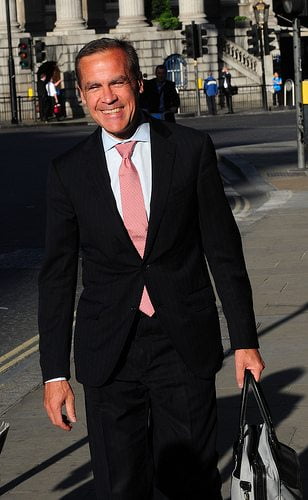

Economy
Responses to Governor Carney’s warning of ‘catastrophic impacts of climate change’
The Governor of the Bank of England’s dramatic analysis of the impacts of climate on financial stability, has been followed by these expert responses. We’ll add to them as we receive them.
Mark Campanale, Founder and Executive Director of the Carbon Tracker Initiative said: “Carbon Tracker welcomes this important milestone, a major international microprudential regulator clearly setting out for the first time how climate risk is a material financial risk.
“The PRA and ourselves share a common acknowledgement that a declining ‘carbon budget’ to 2 degrees will mean that fossil fuels will need to stay in the ground. For investors, including insurance companies, this creates the risks of ‘stranded assets’ in an investment portfolio. Carbon Tracker agrees that the best way to address this risk is by relevant disclosure that allows policymakers, firms and investors the ability to make informed choices.
“Carbon Tracker’s analysis of the world’s top 200 publicly traded fossil fuel companies discovered that they are developing or are proposing to develop enough fossil fuels to take us beyond 4 degrees of warming. This report highlights the risks facing these companies and the potential for litigation related to climate damage.
“With this report, investors will sit up and take notice of the potential risks and liabilities these companies face and begin to re-price this material risk. Fossil fuel investors face the combined risk of their business models being out-competed by price competitiveness of the renewables energy sector, while also potentially picking up the costs of climate damage.”
Stephanie Pfeifer, CEO of the Institutional Investors Group on Climate Change said: “Mark Carney spoke under the Lutine Bell, the way Lloyds has signalled great events that will affect the market. He chose his setting perfectly. We welcome his focus on more consistent and reliable carbon disclosure that will allow investors to make a more informed assessment of the climate risks in their portfolios”.
James Bevan, Chief Investment Officer at CCLA said: “The Bank of England’s public statement that climate risk is a material financial risk speaks to the challenge of so-called stranded assets, and makes planning for declining carbon intensity an absolutely mainstream investment requirement. CCLA agrees that the best immediate means of illuminating the risk are through relevant disclosure that supports informed decision taking. As investors we recognise that the investment risks associated with companies with high carbon intensity are now significant, and CCLA will now work to build coalitions of investors driving change though engagement and co-filing such as with ‘Aiming for A’.”
Julian Poulter, Founder and CEO of the Asset Owner Disclosure Project (AODP): “The lessons of the sub-prime crisis were quickly forgotten by most banks itching to return to their short term ways, but Mark Carney has laid out their next crisis in black and white – “Sub-Clime” is coming and we need to act fast. Investors should be taking action now, not panicking once the crash hits and it is too late.”
John Rogers, former CEO and President of the CFA Institute said: “Mark Carney has offered a worthwhile challenge to institutional investors: Become part of the solution to climate change by acting as fiduciary capitalists. Preventable Surprises applauds this call to action, and will support the financial industry with actionable ideas to help investors engage with the companies whose shares and debt they own.”
Alice Garton, Lawyer at ClientEarth, says: “Today’s report from the Bank of England should sound warning bells for anyone working in the financial sector. It confirms climate change is an immediate, material business risk.
“The case for litigation brought against those ignoring climate change risk grows ever stronger. If directors fail to manage the risks and opportunities presented by climate change, they could be found personally liable for losses incurred by the company in the future.
“Investors such as pension fund trustees and their advisors also have legal duties to manage the risks affecting their portfolios. ClientEarth is examining these duties and we may bring legal challenges if we find that funds are failing to meet their obligations. Investors across the board cannot afford to treat climate change as a distant possibility. Increased regulation, changing market dynamics and heightened risk to physical assets must shape their investment decisions from today.”
David Nussbaum, CEO of WWF-UK said in response: “When the Governor of the Bank of England warns of the economic impacts of climate change, it’s certainly time to listen. This week alone Shell has pulled out of the Arctic, WWF has launched a report about mining companies encroaching on natural world heritage sites, and now Mark Carney is effectively saying ‘change course or prepare for disaster’.
“The writing is on the wall. At the moment, many investors and businesses are ahead of governments in acting on their understanding of the impacts of climate change. Governments need to step up to the plate at the Paris climate talks in December and deliver a deal that will set a path for a low-carbon future – and boost investors’ confidence that they will continue along that path.”


 Environment12 months ago
Environment12 months agoAre Polymer Banknotes: an Eco-Friendly Trend or a Groundswell?

 Features11 months ago
Features11 months agoEco-Friendly Cryptocurrencies: Sustainable Investment Choices

 Features12 months ago
Features12 months agoEco-Friendly Crypto Traders Must Find the Right Exchange

 Energy11 months ago
Energy11 months agoThe Growing Role of Solar Panels in Ireland’s Energy Future





























